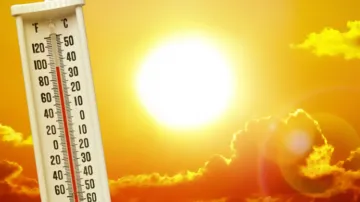The Indian Meteorological Department (IMD) has issued a red alert for a heatwave in Delhi NCR, cautioning residents to take necessary precautions as temperatures are expected to rise above 45 degrees Celsius. The alert comes as Delhi and its neighbouring states are already experiencing scorching heat, with temperatures soaring above 40 degrees. The IMD has predicted that the heatwave will continue for the next few days and has advised people to avoid outdoor activities during the peak hours of the day. The department has also warned that the heat could lead to severe dehydration and heatstroke, especially for children, elderly, and those with underlying health conditions.
When we asked Dr Pankaj Chaudhary, Senior Consultant, Internal Medicine, Max Super Speciality Hospital, Vaishali, about the severe effects of heatwave on our health, he said, "Temperature is hovering around 45 to 47 degrees, and the number of patients is increasing in the outdoor department coming with heat-related illnesses. I see 8-10 patients daily in the hospital and clinic. Extreme heat can have a significant impact on our bodies, and it’s crucial to take precautions to stay safe during hot weather."
Here are some ways extreme heat affects us and tips to protect ourselves:
Negative Impact on Multiple Organs:
High temperatures strain our organs, especially the heart. The heart has to work harder to maintain blood flow to the skin, which helps dissipate heat.
Rapid dehydration occurs due to excessive sweating, leading to electrolyte imbalances and potential kidney strain.
Heat can impair cognitive function, affecting memory and judgment. In extreme cases, it can cause dangerous brain inflammation
Mental health is also affected by heat. Higher temperatures have been linked to increased anxiety, depression, and even suicide rates
Physical Effects:
Blood flow to the skin increases, straining the heart. For every 0.5°C (1°F) rise in core temperature, a typical person’s heartbeat increases by 10 beats per minute, resulting in a racing pulse and light-headedness.
The brain signals muscles to slow down, leading to fatigue.
Nerve cells misfire, causing symptoms like headaches, nausea, or vomiting.
Know the Signs of Heat-Related Illnesses:
- Heat Cramps: Muscle cramps, usually in the legs or abdomen.
- Heat Exhaustion: Symptoms include heavy sweating, weakness, dizziness, nausea, and headache.
- Heatstroke: A medical emergency characterised by high body temperature, confusion, rapid pulse, and unconsciousness.
Tips to Stay Safe in Extreme Heat:
- Stay Hydrated: Drink plenty of water to prevent dehydration.
- Avoid Direct Sun Exposure: Seek shade or stay indoors during peak heat hours (usually between 10 a.m. and 4 p.m.).
- Wear Lightweight Clothing: Opt for loose-fitting, light-coloured clothes to help your body cool down.
- Use Fans or Air Conditioning: Keep your living spaces cool.
- Limit Physical Activity: Avoid strenuous exercise during extreme heat.
- Check on Vulnerable Individuals: Elderly people, young children, and those with pre-existing health conditions are more susceptible to heat-related illnesses.
- Never Leave Children or Pets in Hot Cars: Even a few minutes in a hot car can be life-threatening.
The red alert serves as a timely reminder for people to take necessary precautions and stay safe during this intense heatwave in Delhi NCR.
ALSO READ: Is the heatwave taking a toll on your mood? Here's what you can do
